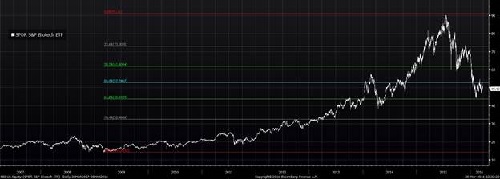Biotechnology stocks were darlings of the post-crisis bull market, with the SPDR S&P Biotech Fund (NYSE:XBI) -- an ETF that is equal-weighted and thus reflects the performance of the sector’s many small companies more than other ETFs -- registering a more-than-530-percent gain from the 2009 lows to the high in July, 2015. The collapse since that high retraced nearly two-thirds of the move before beginning to recover in late February.
SPDR S&P Biotech ETF (XBI) Retraced 61.8 Percent of Its Rise From the 2009 Low to the 2015 High
Source: Bloomberg
So with that retracement under their belt, should biotechs be a place where investors start bargain-hunting? Our simple answer is “No.”
Is Biotech Cheap Now? Nope.
It’s important to remember that biotech investing -- outside the big-cap biotechs such as Celgene (NASDAQ:CELG) and Gilead (NASDAQ:GILD) -- is simply not based on fundamentals, that is, on a careful and realistic assessment of risks and future earnings. XBI taken as a whole, for example, as of this writing has a price-to-earnings ratio of 988 (based on the past 12 months of earnings -- remarkably, there are in fact enough constituents of the index that actually have earnings to drag the average into positive territory). Another commonly used vehicle, the iShares Nasdaq Biotechnology ETF (NASDAQ:IBB), which is market-capitalization weighted and thus heavier in companies that are actually profitable, comes in at a price-to-earnings ratio of 72 (also based on the last 12 months of earnings). In short, even after a correction of over 60 percent, biotech is still very far from being cheap on a fundamental basis. Thus, it makes little sense to think of biotech as a “beaten down” sector -- as if it were like other sectors or markets that have beaten down to a valuation below that supported by their fundamentals. Biotech would have a lot farther to fall before it would join that category.
(We are also skeptical about some of the valuation techniques used for fundamental analysis of biotech stocks which ascribe value based on the purported likelihood of the success of as-yet unapproved new drugs. For example, an analyst might judge that a new drug could generate $100 million a year in earnings, and ascribe a 20 percent chance that the drug will be approved -- and then factor $20 million in earnings into their model. However, even for capable analysts with doctoral-level scientific education, estimating chances of success is at best a matter of educated guesses. And in the example given, the earnings will very likely not be $20 million, but zero or $100 million -- a “binary event.” So the share price targets that analysts come up with for development- and clinical-stage biotech companies should be taken not just with a grain, but with a mountain of salt -- or disregarded altogether, except insofar as they are clues as to what other investors are thinking.)
What really matters for biotech investing -- again, outside the big-cap biotechs that have real earnings -- is momentum and psychology; and if these are supportive, biotech can make sense for investors. Neither momentum nor psychology is now in play for biotech. If the U.S. market does have another push past the old highs, it is not clear that biotechs will remain the anointed leaders of the rally -- and as we have been observing since last year, the surrounding macro environment is not one that will support positive psychology for biotech.
Election-Year Woes and the Pharma/Biotech Whipping Boy
What is that environment? The election season, in which drug prices are a talking-point for politicians of all stripes, and drug companies a political punching-bag from right and left. Who is going to pass up the political hay that can be made by criticizing drug prices and calling for outright price controls or at the very least Medicare price negotiation? We think no one. The best that can be hoped is that if both nominees agree on the matter, they won’t talk about it too much during the campaign. But frankly, that’s not likely.
Investment implications: Biotech is down big from its peak last year, with some indices falling almost two-thirds, and many stocks having fallen much more. However, that doesn’t mean it’s cheap. On a fundamental basis, biotechs are still very expensive -- especially the small- and mid-sized companies. Thus it makes no sense for investors to treat biotech as they would treat sectors or markets that have truly been beaten down below valuation levels supported by their fundamentals. Biotech stocks trade on momentum and psychology; momentum looks unlikely to return, particularly in the face of market psychology shaped by an election campaign in which it’s “open season” on drug companies. Even established and profitable biotechs may well languish as the rest of the sector labors under this negative psychology, so for now, we think investors should not be tempted to dip their toes. After the Presidential election, when we know the attitude of the victor towards drug prices, we will know more. After legislation is implemented to cut prices, we will be better able to determine fair valuations for the participants in the industry.

